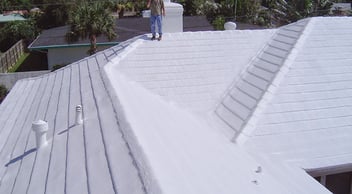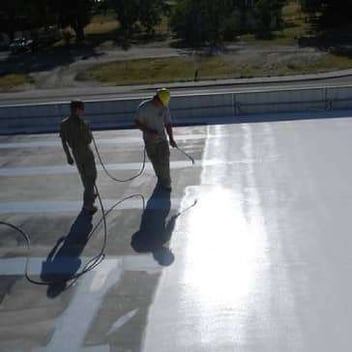- Home »
- Learningcenter »
- Elastomeric vs roof coating
Elastomeric vs. Roof Coating: Which is Better For Your Building?
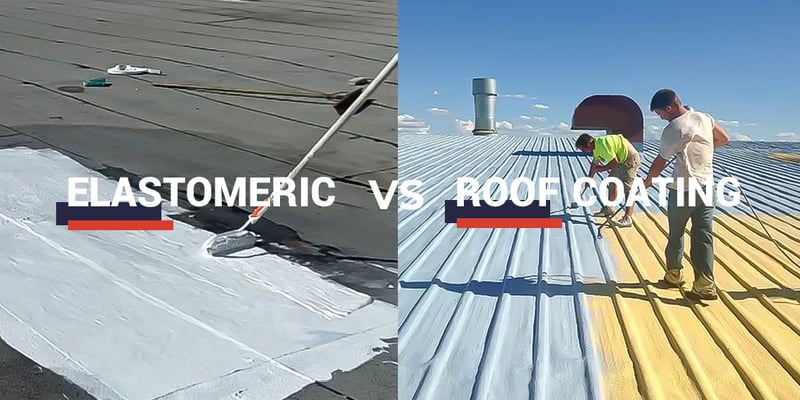
Roof coatings can be a great way to extend the life of your roof and provide further protection from the sun's heat, damage, and leaks. They can even help to seal over small cracks in your existing roof and create a seamless waterproof barrier.
When you start looking into roof coatings, though, it's easy to feel overwhelmed by the variety of options. Is it better to get an elastomeric roof coating or one of the other types of roof coatings?
Most non-bituminous roof coatings are elastomeric, which means they can help accommodate the expansion and contraction of the roof membrane caused by thermal fluctuations.
What Are Roof Coatings?
Roof coatings can help to protect and preserve a commercial roof. Your roof is constantly exposed to weather and heat from the sun, and roof coatings can help reduce the damage the elements can do to your roofing system.
When your roof is on the older side but could use some extra TLC, roof coatings can be a great way to extend the life of your existing roof. Even if there are small cracks in your roof, roof coatings can seal over these small intrusions to solve small leaks that have been plaguing your building.
Roof coatings can help building owners save money because they can extend the life of an existing roof. Rather than replacing the existing roof right now, which is typically a significant investment, roof coatings can help extend a roof's lifespan by nearly another ten years.
Another great thing about roof coatings is that they often improve the energy efficiency of a roof. These coatings can have high reflectivity ratings, meaning they reflect heat from the sun away from your building rather than absorbing the sun's heat. This isn't just a nice thing to do for the environment; it also keeps your cooling bills down in the summer and eases the strain on your cooling system.
What Are Elastomeric Roof Coatings?
Elastomeric roof coatings are one of the types of roof coatings that are commonly used on commercial flat roofs. Applied as a liquid with a consistency similar to paint on top of an existing roof, this material cures to form a waterproof, monolithic membrane.
This substance has a high amount of elasticity, as you can infer from the name. This elasticity allows the material to expand and contract as there is temperature fluctuation throughout the day, which helps to make it more capable of protecting your roof from damage and leaks.
It's common for elastomeric roof coatings to come in highly reflective colors, so in addition to helping solve and prevent leaks, it can also help keep your roof's temperature much lower than if you had a standard black roof. This can help reduce your energy bills and make it so your HVAC system doesn't have to work nearly as hard to keep your building's interior comfortable.
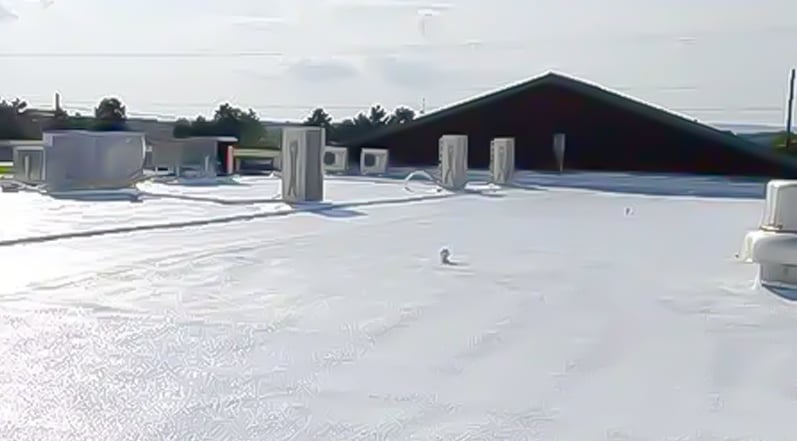
Elastomeric coatings can be applied to nearly all types of commercial roofing systems, including metal roofs, single-ply systems, and built-up roofs.
If all that doesn't sound good enough, elastomeric coatings can be reapplied after roughly ten or fifteen years. This means that you can continue to extend the life of your roof, ensuring that your structure is protected while also saving money along the way.
How Many Types of Roof Coatings Are There?
There are a number of different general categories of roof coatings available on the market. Before you purchase and apply a roof coating, you'll want to ensure that the material you've chosen is legal in the state or jurisdiction of the property, as there can be health or environmental restrictions for some types of coatings.
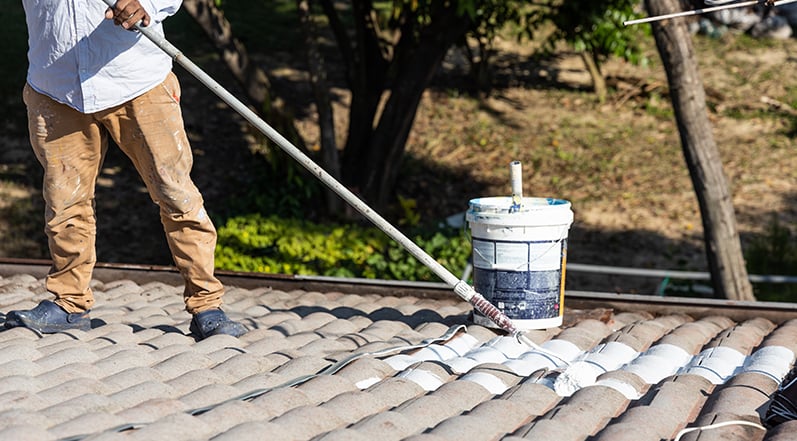
Here's what you should know about each type of roof coating:
- ● Elastomeric Roof Coatings: With elastic properties, these roof coatings can stretch without damage. This helps to accommodate thermal expansion and contraction in a roof system as well as the movements of the building. Non-bituminous roof coatings will commonly be elastomeric.
- ● Bituminous Roof Coatings: These roof coatings utilize asphalt or coal tar as the primary waterproofing component.
- ● Fibered Roof Coatings: Made with fiberglass fibers or cellulose that are between ¼" and 1" long, fibered roof coatings increase tear resistance. You'll usually only find fibers in non-elastomeric coatings.
- ● Polymeric Roof Coatings: Various synthetic resins can be used to make polymeric coatings to waterproof the material. You can find silicone, acrylic, and polyurethane polymer-based coatings– available in several other materials, but these three are the most common.
- ● Polymer Modified Roof Coatings: This is another type of bituminous coating that tends to be longer-lasting, more flexible, and more costly than coatings that don't utilize the same bitumen-compatible polymer formula. You might also hear this type of coating discussed using the term "rubberized."
- ● Cool Roof Coatings: Any roof coating that helps to reflect sunlight away from the roof and reduce the amount of heat absorbed from the sun can be considered a cool roof. Compared to traditional materials, this helps to increase thermal emittance. Coatings that are made with reflective pigments or that come in white are typically considered cool roof coatings.
- ● Rubberized Roof Coatings: This is the same thing as a polymer modified roof coating. Essentially, it is a bituminous coating that has been modified using a synthetic rubber to make it more flexible and long-lasting.
- ● White Roof Coatings: White roof coatings are typically considered reflective or cool. The term "white roof coating" doesn't refer to any particular type of roof coating but rather just the color of the coating. The most commonly used pigment to create white coatings is titanium dioxide.
- ● Reflective Roof Coatings: Any roof coating that has been designed to be highly reflective is considered a reflective roof coating. These might be aluminized, white, or even other colors that include special reflective pigments. Reflective roof coatings help to keep the roof and structure cool during warmer months.
The Available Types of Roof Coating Materials
Now that you have a sense of the general categories that roof coatings can come in, let's take a look at some of the materials roof coatings can be made with.
Acrylic Roof Coatings
Acrylic roof coatings are one of the cheapest available types of roof coatings, but other materials can offer a longer lifespan. They are available in a wide variety of colors. Acrylic roof coatings are elastomeric, but they aren't the best for chemical resistance, dealing with foot traffic, or handling ponding water. That being said, there can be major quality differences between specific products.
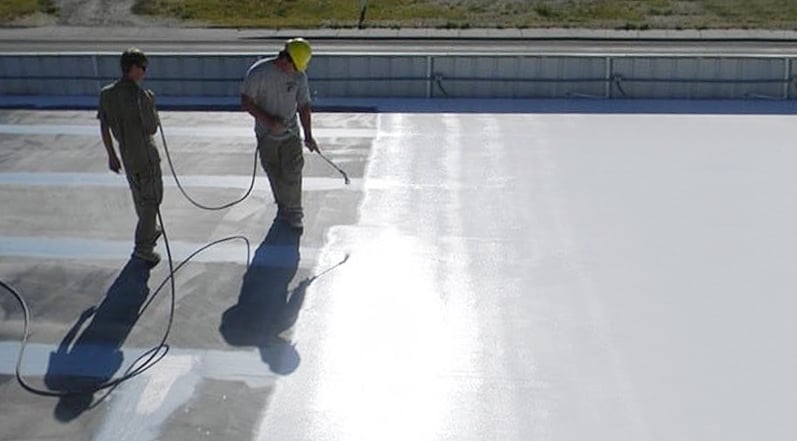
While acrylic coating formulations are available for many different types of substrates, they typically can't be applied to gravel-surfaced built-up roofs or existing silicone coatings.
Silicone Roof Coatings
Silicone roof coatings are another type of elastomeric coating. They can be applied to PVC, EPDM, metal, TPO, spray polyurethane foam, and existing roof coatings. However, they can't be applied to gravel-surfaced roofing and usually can't be applied to asphalt or coal tar pitch roofing.
One of the downsides of silicone roof coatings is that it can be hard to recoat them as it's hard for anything else to adhere to silicone coatings. In order to recoat this type of coating, another silicone coating needs to be used, or the existing coating first has to be removed.
![]()
A long-lasting type of roof coating, these are also typically quite a bit more expensive than the cheapest acrylic options. Silicone coatings have the longest useful life of all the most frequently used roof coating types.
Though silicone roof coatings aren't great at handling foot traffic, they have good chemical resistance and are well-equipped to handle ponding water.
Coal Tar Pitch-Based Roof Coatings
This is not an elastomeric roof coating, and its main components are refined coal tar pitch, a solvent, and a stabilizer. They can be applied to concrete or smooth-surfaced coal tar pitch built-up roofing. They cannot be applied to single-ply membranes, SPF, asphalt roofing, or existing coatings that aren't coal tar pitch coatings.
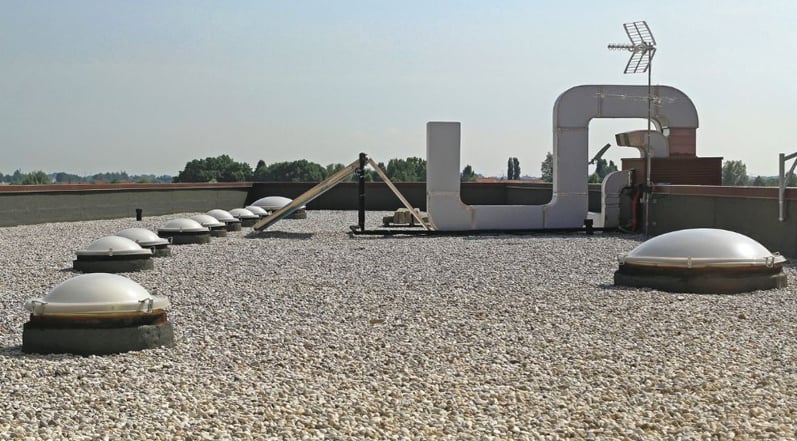
Coal tar pitch-based roof coatings are difficult to find nowadays and are rarely if ever used on new roofing installations. However, you might want to track it down if you are recoating a roof with this type of coating.
Polyurethane Roof Coatings
There are two primary types of polyurethane roof coatings: aliphatic and aromatic.
Aliphatic polyurethane roof coatings are solvent based and elastomeric. Great at handling foot traffic and boasting good chemical resistance, this type of coating can be applied to many substrates, including EPDM, PVC, TPO, metal, SPF, smooth-surface built-up roofing, and modified bitumen.
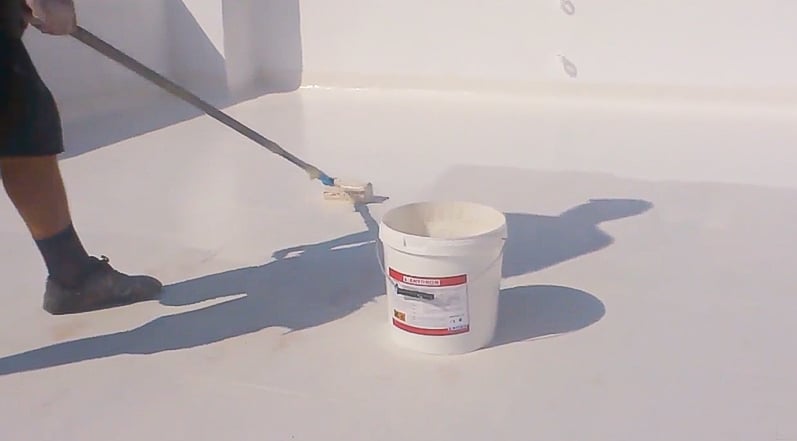
Aromatic polyurethane coatings can't be used alone as a roof coating because it is susceptible to UV degradation. It's therefore common for aliphatic polyurethane coatings to be applied on top of aromatic polyurethane coatings as the top coat, as aromatic polyurethane coatings are less expensive than aliphatic polyurethane coatings and the latter is very UV stable.
PUMA Roof Coatings
Polyurethane-modified acrylic coatings are another type of elastomeric roof coating. They have great chemical resistance and can handle foot traffic very well.
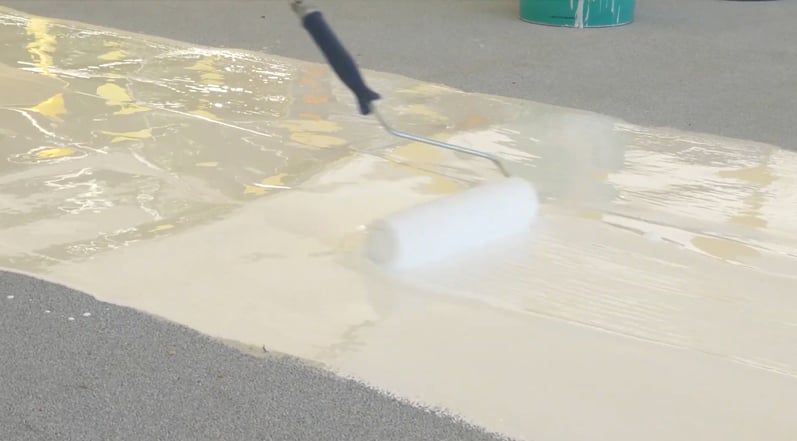
Lasting quite a bit longer than the standard acrylic coating, this is a common choice for surfaces that need to support traffic from vehicles.
SEBS Roof Coatings
Another elastomeric roof coating, styrene ethylene butadiene styrene (SEBS) roof coatings are solvent-based and very compatible with steel roofing.
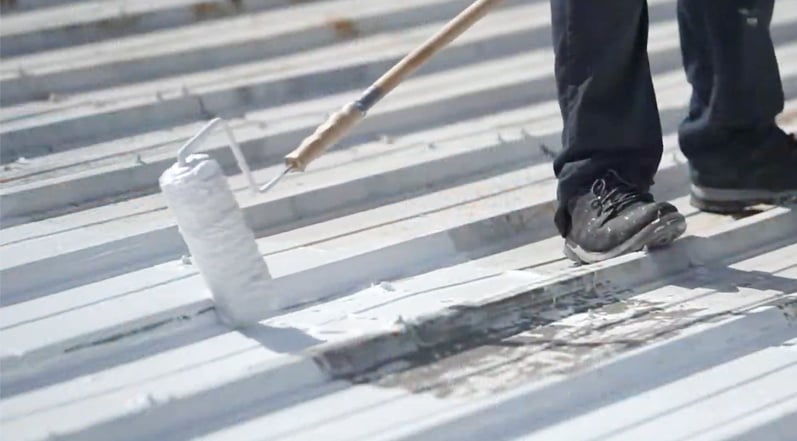
While they can't be applied to PVC, KEE, or EPDM, acceptable substrates include TPO, metal, and hypalon.
Soy-Based Roof Coatings
Soy-based roof coatings are advertised as relying on a renewable resource (soy) rather than petroleum. However, it's important to look at the actual ingredients before buying a soy-based coating if you are interested in an environmentally friendly option, as they often only contain a small amount of soy.
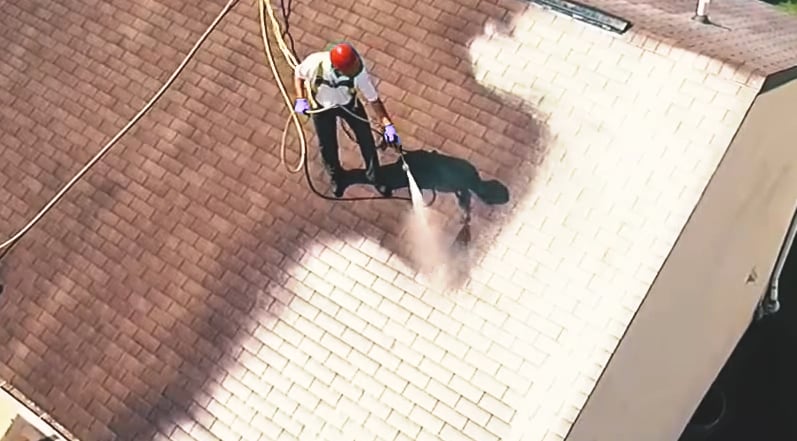
These are usually elastomeric roof coatings, but not always.
Aluminized Roof Coatings
Aluminized roof coatings aren't elastomeric and are available in both fibered and non-fibered varieties. They can be applied to existing asphalt coatings, smooth-surfaced asphalt built-up roofing, metal, and modified bitumen.
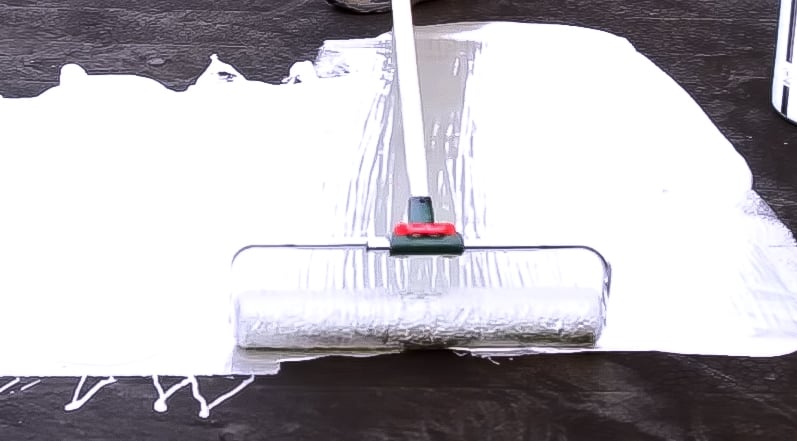
This type of coating is primarily used because of its ability to reflect the sun's rays and keep a roof cool. It is particularly common to use aluminized roof coatings on modified bitumen.
Asphalt Cutback Roof Coatings
Another non-elastomeric roof coating, this is a coating made primarily with asphalt and mineral spirits. You can find asphalt cutback roof coatings in fibered or non-fibered varieties.
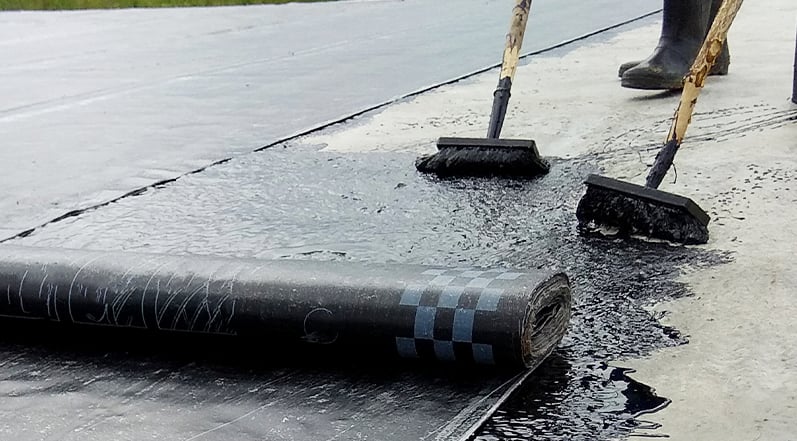
There are also asphalt emulsion roof coatings that are water rather than solvent-based.
Butyl Roof Coatings
This elastomeric polymeric coating is typically more expensive than other options.
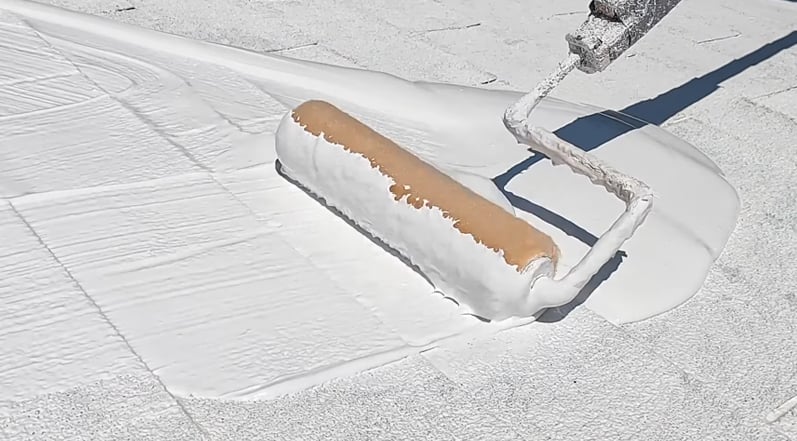
Great at handling ponding water, butyl roof coatings can be applied to SPF, metal, modified bitumen, TPO, PVC, and smooth-surfaced built-up roofing.
Is It Time to Put a Roof Coating on Your Commercial Roof?
If you're ready to extend the life of your roof and provide additional protection from damage and the sun's rays, a roof coating can be a great cost-effective choice. There are a number of different types of roof coatings that you can choose from, and, in part, your options are limited depending on the existing roofing system on your building.
It can be useful to have a qualified, professional roofing contractor come out and take a look at your roof so they can give you a sense of your different roof coating options. It's also important to note that roof coatings are best when applied to roofs that are generally in good condition, even if they are near the end of their life.
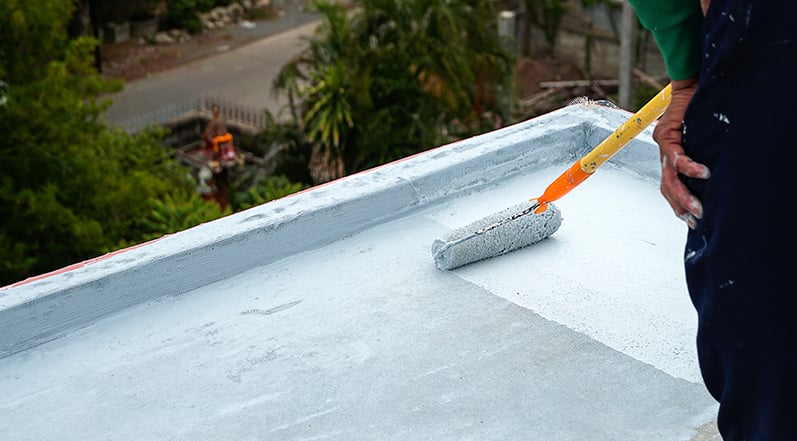
At Colony Roofers, we specialize in providing the highest quality roofs for the most affordable prices in the Atlanta area. Whether you need a roof repair, replacement, or a roof coating applied, we're the team for the job.
Please feel free to contact us today with any questions you might have or to set up an appointment for a free estimate! And if you're looking for any further information about coating, roofing materials, shingles, or anything else roofing-related, we highly recommend you check out our learning center! With a plethora of articles already available and more on the way every week, you're bound to find useful information for your needs.
 Call (678) 365-3138
Call (678) 365-3138

